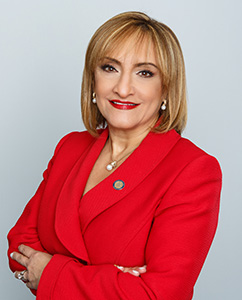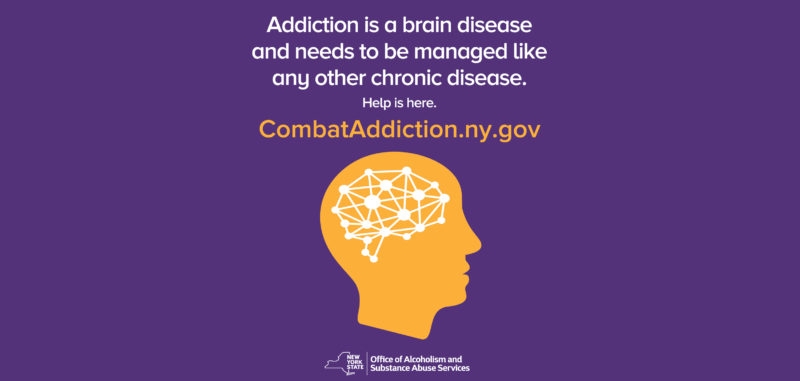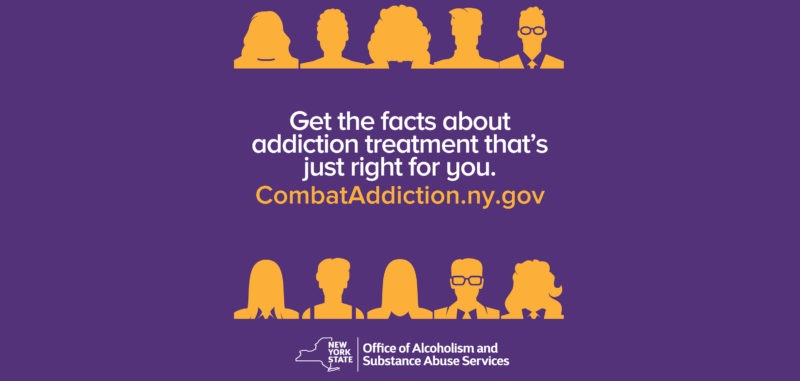Over 20,000 professionals make up the Substance Use Disorder (SUD) Prevention, Treatment and Recovery Workforce in NYS. The US Bureau of Labor Statistics projects that the SUD workforce will grow at a much faster rate than other occupations in the country and in NYS. The Credentialed Alcoholism and Substance Abuse Counselor growth rate in NYS is projected at 30% between now and 2026 with 1,280 average annual openings projected. That number includes those needed to meet the new demand as well as those that will need to backfill the positions created by the average annual separations in this occupation.

Arlene González-Sánchez
Commissioner, NYS OASAS
To help meet this need many local Career Centers across the state received Opioid Disaster funds to fund occupations associated with the opioid crisis. Career Centers in the following areas received these funds and those interested in training for an addiction career should visit one of the following Career Centers, Columbia/Greene, Finger Lakes (Ontario/Wayne/Seneca/Yates), Nassau (Hempstead/Long Beach), Herkimer/Madison/Oneida, Monroe, North Country (Essex/Franklin/Clinton), Onondaga, Orange, Suffolk, Sullivan, Westchester/Putnam to inquire about the availability of funds. Additionally, OASAS has received $350,000 for scholarship funds this year and those funds will be disseminated to those working in OASAS Prevention and Treatment programs. OASAS has funded Certified Recovery Peer Advocate (CRPA) scholarships for the past two years.
Additionally, OASAS received $2M in Recovery Tax Credits to disseminate to employers to offset their corporate sales tax. On or after January 1, 2019 OASAS will disseminate $2,000 tax credits to for-profit employers for each new employee they hire who is in recovery from a SUD. Many employers have already found the benefit of hiring recovering people into their workforce and the Recovery Tax credits will be used to increase those instances. Recovering individuals are not only dependable, reliable and hard-working employees but they can also have a positive impact on their colleagues who may be suffering from addiction themselves or are struggling with a family member or loved one who is addicted. The Recovery Tax Credit program makes recovering individuals even more attractive to employers and helps reduce the stigma that has plagued those recovering from addiction. It is an investment in the recovery capital that individuals have built through their recovery and it will go a long way to reaching others in workplaces that are struggling with addiction.
OASAS ensures that staff working in the continuum of prevention, treatment and recovery services are competent in delivering addiction service by providing credentialing for SUD and gambling prevention and treatment professionals. OASAS also provides training for other medical and behavioral health professionals working in our system. Currently, no other NYS licenses/certifications require addiction competencies as part of their required pre-service coursework or examinations. Many professionals voluntarily seek out elective coursework during their pre-service education and may obtain addiction credentials/certifications in the course or their career, but addiction competencies are not part of obtaining a medical or behavioral health license in NYS, which is why OASAS must continue to credential addiction professionals and require additional addiction training for those working in our services.
Prevention staffing guidelines require all Prevention Directors and a percentage of staff to have either an OASAS prevention credential or a related certification (i.e. – Teaching, Health Education, Social Work) along with SUD prevention specific coursework and experience. OASAS also requires that all new Prevention Specialists complete a Substance Abuse Prevention Skills Training (SAPST) course within their first year of employment in an OASAS funded Prevention Program. The SAPST is a blended learning course consisting of a 5-hour online course and a 4-day face to face course. The course was developed by the U.S. Substance Abuse and Mental Health Services Administration (SAMHSA) to give Prevention Specialists a foundational training in the SUD prevention framework.
Treatment staffing requires a multi-disciplinary team format. Most levels of care require a Medical Director with a DATA 2000 Waiver, which allows them to dispense addiction medications. Many programs also employ Nurse Practitioners and Physician Assistants with DATA 2000 waivers to extend their ability to provide addiction medications for their patients/clients. Nursing staff are also a required component of many levels of care. Additionally, programs include Credentialed Alcoholism and Substance Abuse Counselors (CASACs) and other licensed, Social Workers, Mental Health Counselors and/or Marriage and Family Therapists. Many programs also employ vocational counselors, and some have recreation therapists.
In 2018, OASAS implemented a SUD Counselor Scope of Practice which outlines a career ladder for SUD Counselors and indicates which clinical skills each level can perform and what level of supervision is required for each level. All Supervisors must at a minimum have a national credential or state licensure and a bachelor’s or master’s degree. Supervisors must also complete a 30 Hour Clinical Supervision course to be at the Advanced or Master Level and to supervise clinical staff. Additionally, all staff are required to complete training on Medication Assisted Treatment/Recovery, SUD Ethics, SUD Confidentiality and other addiction coursework as a minimum requirement for their orientation. All programs are required to document that staff meet and maintain their credentials and complete the orientation coursework. OASAS also offers, at least monthly, free, online training on pertinent addiction topics which includes a year-long series on Ethics which can be accessed at: https://www.oasas.ny.gov/testportal/LTcourses.cfm . Additionally, free regional trainings are offered throughout the state and can be found at: https://www.oasas.ny.gov/workforce/training/oasastraining.cfm.
Along with treatment services, recovery services have expanded throughout the state. Community based recovery services are now available in all regions and in many communities across NYS. The Peer Workforce are the newest members of the SUD workforce. In 2013, OASAS approved the New York Certification Board (NYCB), a subsidiary of the New York Alcoholism and Substance Abuse Providers (ASAP), to certify Certified Recovery Peer Advocates (CRPAs). Since then more than 1,100 CRPAs have been certified and may now perform Peer Services in OASAS outpatient clinics and those services can be reimbursed by Medicaid and Managed Medicaid.
To incentivize CRPAs, OASAS provided $500,000 in scholarships over the last 2 years to help them obtain their certifications. There is also a planned increase in the Peer Service reimbursement rates and the number of Peer Services that can be performed in a day has also increased considerably to incentivize the adoption of Peer Services in OASAS outpatient clinics. OASAS provides onsite Peer Integration services for all OASAS providers and have formulated a toolkit which can be found at: https://www.oasas.ny.gov/recovery/OrgReadinessTool.cfm. Additionally, Peer Services are also now a required component in OASAS’ outpatient settings.
Only by strengthening the addiction workforce to meet the expanding needs of those suffering from addiction, and finding gainful employment for those recovering from addiction, will we be able to increase the capacity of competent and effective prevention, treatment and recovery services and reduce the stigma of those impacted by addiction.





